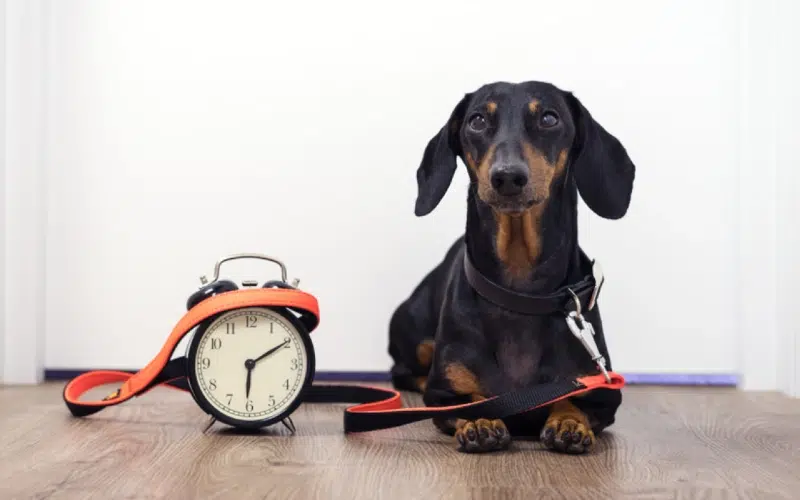In this article
View 6 More +If you have been a dog owner for a while, you’ve likely noticed your pet waiting for you when you get home from work, getting excited about their mealtime before you even stand up to fill their bowl, and even preparing to bark at the mail carrier just before they arrive each day. This can cause many people to wonder if dogs have a sense of time. The short answer is technically yes, but canines perceive time much differently than we humans do.
Here, we discuss dog memory in-depth, discuss ways that you can help them manage their time better, and answer common questions on this topic.

Can Dogs Tell Time?
Dogs do have a sense of time, but it is much different from ours, and they don’t follow minutes or hours. Instead, they rely on their circadian rhythm, several kinds of memory, and routine to know when something should happen.

Circadian Rhythm
The circadian rhythm is your dog’s internal biological clock, which affects their sleep-wake cycles, hormone production, and overall behavior. The day and night or, more accurately, light and dark influence the dog’s body, mind, and behavior. This will help them know when they are supposed to go to sleep, wake up, eat breakfast, etc.
Episodic Memory
Episodic memory is a key tool for dogs, and they can use it to predict the future accurately. For instance, when your alarm clock goes off in the morning, your dog knows that a whole sequence of events will follow. This type of memory also helps them remember the tone of your voice, the sound of your car, keys rattling, and other noises that clue them into what is about to happen.
Senses
Dogs can make use of their senses to help them know what time it is. For example, their keen sense of smell can be familiar with morning smells, such as coffee brewing, so perhaps they can also detect how a scent deteriorates over time, enabling them to have an idea of how long it’s been since you left the house. They may also be able to tell how much your smell dissipates each day before you return, which can help them accurately predict when you will be home. Or they associate smells that happen at a certain time with routine events that normally happen around the same time.
Routine
Another powerful tool that your dog uses to know when something is going to happen is routine. Dogs depend on routines at every stage of their life to feel comfortable and secure. Establishing a solid schedule takes away any uncertainty and anxiety that your pet might have about when they are going to eat next or when you will return home. Routine is also how your dog knows when it is time for bed and when it’s time to wake up. In fact, many of the things that your dog predicts are things that you do regularly.


Tips for Aiding Your Dog’s Sense of Time
- A regular schedule for meals, walks, and playtime can help your dog establish a routine that helps them feel secure and manage their expectations about what happens next.
- Help your dog understand time better by using specific signals for different activities. For example, picking up a leash can signal that it’s time for a walk, while a certain sound or command can indicate playtime.
- Puzzle toys can help pass the time by keeping your dog mentally stimulated while you’re away.

Frequently Asked Questions (FAQ)
Is It True That Dogs Have a Better Sense of Time in the Morning and Evening?
Mornings and evenings are usually high-activity times of the day, as it’s when you wake up or get ready for bed. Likewise, for most dogs, this is when feeding time happens, making them some very important and much-appreciated moments of the day. This makes your dog more focused and tuned in to the minute-by-minute activities that are occurring, making them seem like they have a better sense of time.
Do Dogs Perceive Time Differently When They’re Alone?
The amount of activity that occurs during a time can affect your dog’s perception of it, and it is likely that when you are away from home, and nothing is occurring to keep your dog’s interest, time can seem to slow down and stretch on for your pet.

How Does Aging Affect a Dog’s Perception of Time?
Aging can impact a dog’s health and cognitive functions, altering their routine and sense of time. As they participate in fewer activities, their perception of time might also start to slow.

Summary
Dogs do have a sense of time and can tell the difference between morning and night. They can also tell when it’s time for you to get home from work and when it’s time for dinner, among many other things, due to several different mechanisms that include a circadian rhythm, episodic memory, senses like sight and smell, and routine. However, they don’t really pay attention to time in minutes or hours and use their sense of time more to know when something will happen.
Featured Image Credit: Masarik, Shutterstock























